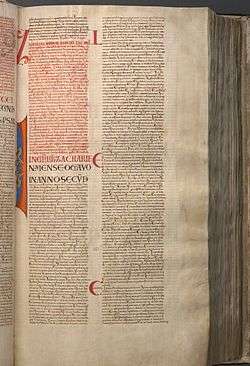Zechariah 4
| Zechariah 4 | |
|---|---|
 The beginning part of the Book of Zechariah (1:1-6:15) in Latin in Codex Gigas, made around 13th century. | |
| Book | Book of Zechariah |
| Bible part | Old Testament |
| Order in the Bible part | 38 |
| Category | Nevi'im |
Zechariah 4 is the fourth chapter of the Book of Zechariah in the Hebrew Bible or the Old Testament of the Christian Bible.[1][2] This book contains the prophecies spoken by the prophet Zechariah, and is a part of the Book of the Twelve Minor Prophets.[3][4]
Text
- The original text is written in Hebrew language.
- This chapter is divided into 14 verses.
Textual versions
Some most ancient manuscripts containing this chapter in Hebrew language:
- Masoretic Text (10th century)
- Dead Sea Scrolls: (2nd century BC)[5][6]
- 4Q80 (4QXIIe): extant: verses 1‑2, 4[5]
Ancient translations in Koine Greek:
- Septuagint (3rd century BC)
- Theodotion version (~AD 180)
Structure
NKJV groups this chapter into:
- Zechariah 4:1-5 = Vision of the Lampstand and Olive Trees
- Zechariah 4:6-10 = Word of the Lord to Zerubbabel
- Zechariah 4:11-14 = The Olive Trees
Verse 6
- Then he answered and spake unto me, saying,
- This is the word of the Lord unto Zerubbabel, saying,
- Not by might, nor by power, but by my spirit,
- saith the Lord of hosts.[7]
- This is the word of the Lord unto Zerubbabel, saying,
- "This is the word of the Lord unto Zerubbabel": The Lord's message unto Zerubbabel is the purport of the vision, viz. that his work will be accomplished through the grace of God alone. Not by might. Septuagint, "not by great might;" but the Vulgate, "not by an army." The word is almost synonymous with the following, translated power; and the two together mean that the effect is to be produced, not by any human means, however potent. Doubtless Zerubbabel was dispirited when he thought how much there was to do, how feeble the means at his disposal (Nehemiah 4:2), and how formidable the opposition; and nothing could better reassure him than the promise of Divine aid.[8] The temple was a type of the church, and Zerubbabel a type of Christ; he was so in the high esteem he was had in by the Lord; he was chosen by him; made as a signet, and was precious to him, Haggai 2:23 in his titles and characters, a servant of the Lord, and governor of Judah, Haggai 1:1 and in his work, in bringing the Jews out of captivity, and in rebuilding the temple: so Christ is the chosen of God, and exceeding dear and precious to him; is his righteous servant, and Governor of the church, or King of saints.[9]
- "But by my Spirit". The angel does not say expressly what is to be done; but the purpose that filled the minds of Zechariah and Zerubbabel applied the word. The operations of the Spirit are manifold, and his aid alone could bring these mighty things to pass. The oil is a figure of the grace of the Holy Spirit; and as the lamps are not supplied by human hands, but directly from the olives, so the good work now undertaken shall be supported by Divine means.[8] As the lamps burned continually, supplied with oil from a source (the living olive trees) which man did not make, so Zerubbabel need not be disheartened because of his weakness; for as the work is one to be effected by the living Spirit (compare Haggai 2:5) of God, man's weakness is no obstacle, for God's might will perfect strength out of weakness (Hosea 1:7; 2 Corinthians 12:10; Hebrews 11:34).[10] Also in the might of His own Spirit He appointed in the Church "first Apostles, then prophets and evangelists" 1 Corinthians 12:28, and all the rest of the saintly band, filling them with divine gifts and enriching them abundantly by the influx of His Spirit."[11]
See also
- Related Bible parts: Haggai 1, Zechariah 1, Zechariah 2, Zechariah 3, Zechariah 5, Zechariah 6
Notes and references
- ↑ Collins 2014.
- ↑ Hayes 2015.
- ↑ Metzger, Bruce M., et al. The Oxford Companion to the Bible. New York: Oxford University Press, 1993.
- ↑ Keck, Leander E. 1996. The New Interpreter's Bible: Volume: VII. Nashville: Abingdon.
- 1 2 Dead sea scrolls - Zechariah
- ↑ Timothy A. J. Jull; Douglas J. Donahue; Magen Broshi; Emanuel Tov (1995). "Radiocarbon Dating of Scrolls and Linen Fragments from the Judean Desert". Radiocarbon. 38 (1): 14. Retrieved 26 November 2014.
- ↑ Zechariah 4:6
- 1 2 Joseph S. Exell; Henry Donald Maurice Spence-Jones (Editors). The Pulpit Commentary. 23 volumes. First publication: 1890.

- ↑ John Gill. John Gill's Exposition of the Entire Bible. Exposition of the Old and New Testament. Published in 1746-1763.

- ↑ Robert Jamieson, Andrew Robert Fausset; David Brown. Jamieson, Fausset, and Brown's Commentary On the Whole Bible. 1871.

- ↑ Barnes, Albert. Notes on the Old Testament. London, Blackie & Son, 1884. Reprint, Grand Rapids: Baker Books, 1998.

Bibliography
- Collins, John J. (2014). Introduction to the Hebrew Scriptures. Fortress Press.
- Hayes, Christine (2015). Introduction to the Bible. Yale University Press.
External links
Jewish
Christian
This article is issued from
Wikipedia.
The text is licensed under Creative Commons - Attribution - Sharealike.
Additional terms may apply for the media files.